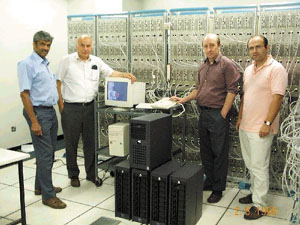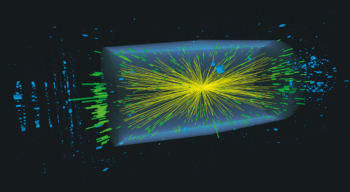
The University of Liverpool has just commissioned a major computer system that is dedicated to the simulation of data for current and future scientific experiments.
One of the largest in Europe, the system comprises three hundred 400 MHz PCs running under Linux. The primary role of the computer system is to simulate large numbers of events to help to optimize the design of the central vertex detector for the LHCb experiment at CERN’s LHC proton collider.
The Monte Carlo Array Processor (MAP) is now fully commissioned and produces more than 250 000 fully simulated events per day. All of the components of the system are low-price commodity items packed into custom rack-mounted boxes. The mounting ensures minimal space requirements and optimal cooling.
The power of MAP reflects the simplicity of its architecture, with essentially all of the PCs dedicated to one job. A custom control system and protocol written at the University of Liverpool has enabled very reliable communication between the “master” and the “slave” nodes on the 100BaseT internal network.
A small fraction of the system is reserved for system development and it is hoped to use this to test direct node to node communication. This would enable MAP to handle problems of much wider applicability than just event simulation.
The project will provide an insight into the operation of large-scale PC arrays planned for the LHC as well as providing the LHCb collaboration with sufficient computer power for its vertex detector optimization studies.
Despite its power, MAP is still a long way from being a general-purpose machine for analysing real or simulated data. A potential solution to the storage and analysis of large amounts of data is to store the output of the experiment on large disk servers.
The Liverpool team has tested a prototype 1 TByte server on loan from Dell Computers, UK. Unlike standard RAID architectures, there are no specialized hardware components but simply 1 Tbyte of SCSI disks attached to a high-performance server. This has the benefit of low cost compared with standard systems, and it is hoped to equip MAP with such a storage system to test its operation in such an environment.





